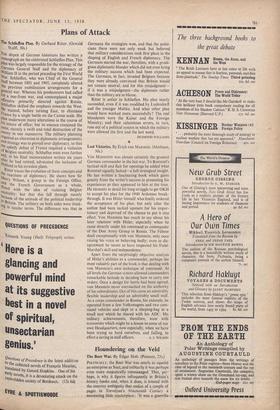Lost Victories. By Erich von Manstein. (Methuen, 50s.)
VON MANSTEIN was almost certainly the greatest German commander in the last war. To Rommel's tactical skill and flair for openings he added what Rommel signally lacked—a full strategical insight. He has written a fascinating book which gains greatly from the writer's success in presenting his experiences as they appeared to him at the time. He recounts in detail his long struggle to get OKH to accept his plan for the 1940 Ardennes break- through. It was Hitler himself who finally ordered the acceptance of his plan, but only after the author had been sacked upstairs for his impor- tunacy and deprived of the chance to put it into effect. Von Manstein has much to say about his later relations with Hitler, especially when he came directly under his command as commander of the Don Army Group in Russia. The Fiihrer dealt exceptionally with von Manstein, only once raising his voice or, behaving badly; even in dis- agreement he seems to have respected his Field- Marshal's skill and independence.
Apart from the surprisingly objective analysis of Hitler's abilities as a commander, perhaps the most valuable part of the book is that dealing with von Manstein's own technique of command. At all levels the German system allowed commanders remarkable latitude in deciding how to carry out orders. Once a design for battle had been agreed, von Manstein never encroached on the authority of his subordinates. Out of this came an admirably flexible leadership and an admirably small staff. As a corps commander in Russia, for example, he operated from a few Volkswagens and two com- mand vehicles and slept in a sleeping-bag in a small tent which he shared with his ADC. His military achievements, therefore, went with economics which might be a lesson to some of our own Headquarters, now especially, when we have been trying so hard ourselves, and failing, to
effect a saving in staff officers. A. J. WILSON


































 Previous page
Previous page